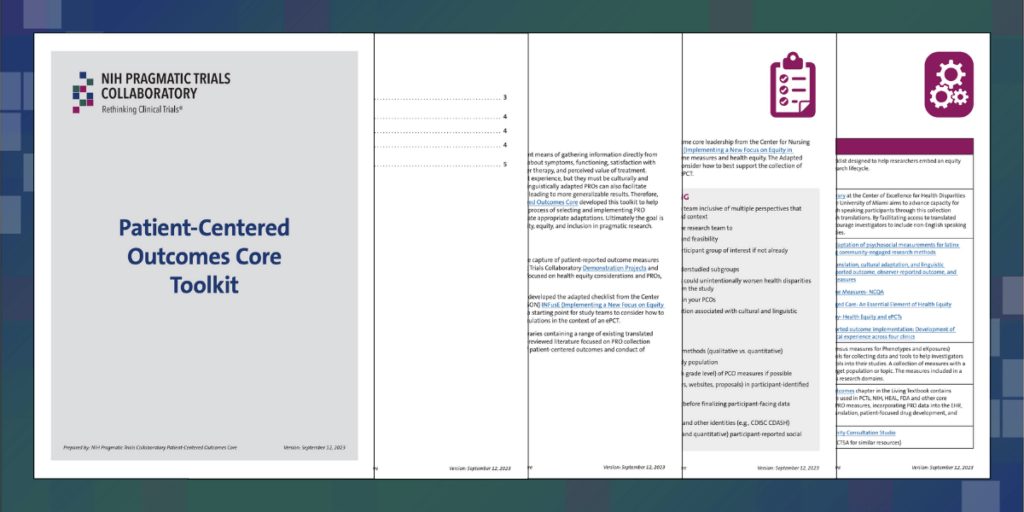Over the last 10 years, the Patient-Centered Outcomes Research Trust Fund (OS-PCORTF) has brought together agencies to work on joint problems and made data investments to enable research that generates knowledge about patient-centered outcomes.
Nancy DeLew, MA, MPA, Associate Deputy Assistant Secretary for Health Policy in the Office of the Assistant Secretary for Planning and Evaluation in the Department of Health and Human Services, and Wendy Weber, ND, PhD, MPH, NIH Project Officer for the NIH Pragmatic Trials Collaboratory, discussed the fund in an interview during the NIH Pragmatic Trials Collaboratory’s annual Steering Committee meeting in April.
The OS-PCORTF has three purposes: to fund research, to fund dissemination and training, and to fund data infrastructure.
Trials, such as the ADAPTABLE study, have used funds from the OS-PCORTF for additional research. In the ADAPTABLE study, for instance, investigators wanted to ask whether the information that is in the electronic health record matches what the patient would report on a variety of patient-reported data. The NIH Pragmatic Trials Collaboratory also organized a roundtable discussion with researchers from the ADAPTABLE study to produce consensus findings on the analysis and integration of patient-reported health data in clinical trials.
“That’s been a really great example of working together,” Weber said. “As the programs evolved and especially in the new strategic planning efforts, there were a lot of questions about how the Collaboratory investigators use all of the various data. They were interviewed and part of the workshops and other elements to help frame the new strategic priorities for the Trust Fund.”
The OS-PCORTF has made prioritizing patient-centered research more possible.
“I think the Trust Fund has helped identify patient-centered, person-centered work as a high priority, which might not have been in the forefront of people’s minds before the Trust Fund was enacted in the Congress,” DeLew said. “By the 10-year reauthorization, we know we have additional funds to do more work. We’re trying to help agencies create evidence that we can then use in decision making in the Department, and we think that will help drive health outcomes over the next decade.”
As the OS-PCORTF moves into its next 10 years of funding, there are a several goals the Trust Fund wants to achieve, DeLew said.
The future focus will be on projects that address national health priorities and projects that will link data over time and help build a longitudinal track record for patients and their experience. Another goal is to take advantage of innovation that is happening in the data field, such as machine learning and artificial intelligence. The Trust Fund also aims to improve health equity and ensure its research is inclusive of populations who might not have been in clinical trials in the past.
“We also want to branch out and move into climate change. That’s an area we haven’t addressed at all in the first decade of the Trust Fund and that’s a high priority for us going forward as well,” DeLew said.
View the full interview.
See the complete materials from the 2022 Steering Committee meeting.
 The Patient-Centered Outcomes Core has developed a new tool kit to provide resources to support the capture of patient-reported outcome (PRO) measures in diverse study populations. The tool kit is intended for research teams conducting pragmatic clinical trials, including those participating in the NIH Pragmatic Trials NIH Collaboratory Trials.
The Patient-Centered Outcomes Core has developed a new tool kit to provide resources to support the capture of patient-reported outcome (PRO) measures in diverse study populations. The tool kit is intended for research teams conducting pragmatic clinical trials, including those participating in the NIH Pragmatic Trials NIH Collaboratory Trials.


 In this Friday’s PCT Grand Rounds, Claire Snyder of Johns Hopkins University and Norah Crossnohere and Anne Schuster, both of Ohio State University, will present
In this Friday’s PCT Grand Rounds, Claire Snyder of Johns Hopkins University and Norah Crossnohere and Anne Schuster, both of Ohio State University, will present 
 In this Friday’s PCT Grand Rounds, Erin Holve, Russell Rothman, Schuyler Jones, and Neha Pagidipati will present
In this Friday’s PCT Grand Rounds, Erin Holve, Russell Rothman, Schuyler Jones, and Neha Pagidipati will present  In this Friday’s PCT Grand Rounds, Ethan Basch of the University of North Carolina at Chapel Hill will present
In this Friday’s PCT Grand Rounds, Ethan Basch of the University of North Carolina at Chapel Hill will present  The US Food and Drug Administration (FDA) will
The US Food and Drug Administration (FDA) will 

 A special series of articles addressing pragmatic and virtual trials appears this week in the journal Contemporary Clinical Trials and offers practical approaches to the many challenges clinical trials face.
A special series of articles addressing pragmatic and virtual trials appears this week in the journal Contemporary Clinical Trials and offers practical approaches to the many challenges clinical trials face.